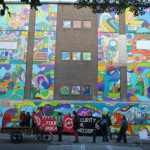Istanbul’s first squat is more than an experiment: it is a counter-hegemonic intervention that challenges the neoliberal dogma of growth at all costs.
In “Occupy the Squares, Squat the Buildings”, a paper written shortly after the eviction of Madrid’s Puerta del Sol, Miguel Martínez and Ángela García show how two movements — the mass popular occupation of Madrid’s central Puerta del Sol, and that of Madrid’s squatted and self-managed social centers — interacted to reinforce one another through shared resources, shared physical spaces, shared logistics and people, and of course shared (but by no means homogeneous) ideas and practices. Horizontality has been the organizational modus operandi of these movements, advancing a staunchly anti-neoliberal, if not outright anti-capitalist critique of Spain’s deteriorating economic and political status quo. This is a status quo primarily characterized by heinous and growing wealth inequality, desperate unemployment, savage austerity, opportunistic privatizations and deeply embedded political corruption.
The opening of Istanbul’s first squatted and self-managed social center, appropriately named Don Kişot (Quixote) shortly after the eviction of Gezi Park, has key parallels with the Spanish experience. The inquisitiveness of one of forty odd police officers during a first visit to Kadiköy’s first squatted and self-managed social center, is revealing: does this have something to do with Gezi Park? The answer, of course, is yes — it has a lot to do with the predominantly anti-authoritarian uprising against the AKP government. The critical yet pragmatic anti-neoliberal or anti-capitalist strand of protest that was so apparent during the Gezi Park occupation has resurfaced in this once empty building, which now houses autonomous community projects of all shapes and kinds. [Read More]













